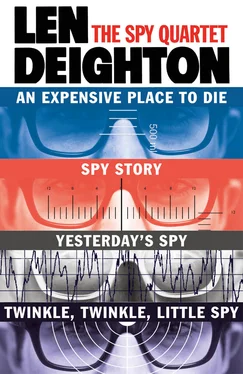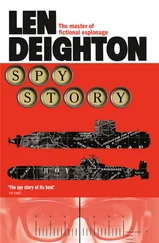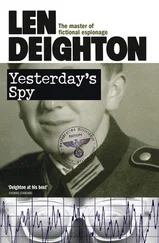‘You mustn’t harm Jean-Paul because of me,’ said Maria.
‘I’m not interested in Drugstore cowboys,’ said Loiseau. ‘At least not until they are caught doing something illegal.’
Maria took out her cigarettes and lit one as slowly as she knew how. She felt all the old angers welling up inside her. This was the Loiseau she had divorced; this stern, unyielding man who thought that Jean-Paul was an effeminate gigolo merely because he took himself less seriously than Loiseau ever could. Loiseau had crushed her, had reduced her to a piece of furniture, to a dossier – the dossier on Maria; and now the dossier was passed over to someone else and Loiseau thought the man concerned would not handle it as competently as he himself had done. Long ago Loiseau had produced a cold feeling in her and now she felt it again. This same icy scorn was poured upon anyone who smiled or relaxed; self-indulgent, complacent, idle – these were Loiseau’s words for anyone without his self-flagellant attitude to work. Even the natural functions of her body seemed something against the law when she was near Loiseau. She remembered the lengths she went to to conceal the time of her periods in case he should call her to account for them, as though they were the mark of some ancient sin.
She looked up at him. He was still talking about Jean-Paul. How much had she missed – a word, a sentence, a lifetime? She didn’t care. Suddenly the room seemed cramped and the old claustrophobic feeling that made her unable to lock the bathroom door – in spite of Loiseau’s rages about it – made this room unbearably small. She wanted to leave.
‘I’ll open the door,’ she said. ‘I don’t want the smoke to bother you.’
‘Sit down,’ he said. ‘Sit down and relax.’
She felt she must open the door.
‘Your boyfriend Jean-Paul is a nasty little casserole,’ 6said Loiseau, ‘and you might just as well face up to it. You accuse me of prying into other people’s lives: well perhaps that’s true, but do you know what I see in those lives? I see things that shock and appal me. That Jean-Paul. What is he but a toe-rag for Datt, running around like a filthy little pimp. He is the sort of man that makes me ashamed of being a Frenchman. He sits all day in the Drugstore and the other places that attract the foreigners. He holds a foreign newspaper pretending that he is reading it – although he speaks hardly a word of any foreign language – hoping to get into conversation with some pretty little girl secretary or better still a foreign girl who can speak French. Isn’t that a pathetic thing to see in the heart of the most civilized city in the world? This lout sitting there chewing Hollywood chewing-gum and looking at the pictures in Playboy. Speak to him about religion and he will tell you how he despises the Catholic Church. Yet every Sunday when he’s sitting there with his hamburger looking so transatlantique, he’s just come from Mass. He prefers foreign girls because he’s ashamed of the fact that his father is a metal-worker in a junk yard and foreign girls are less likely to notice his coarse manners and phoney voice.’
Maria had spent years hoping to make Loiseau jealous and now, years after their divorce had been finalized, she had succeeded. For some reason the success brought her no pleasure. It was not in keeping with Loiseau’s calm, cold, logical manner. Jealousy was weakness, and Loiseau had very few weaknesses.
Maria knew that she must open the door or faint. Although she knew this slight dizziness was claustrophobia she put out the half-smoked cigarette in the hope that it would make her feel better. She stubbed it out viciously. It made her feel better for about two minutes. Loiseau’s voice droned on. How she hated this office. The pictures of Loiseau’s life, photos of him in the army: slimmer and handsome, smiling at the photographer as if to say ‘This is the best time of our lives, no wives, no responsibility.’ The office actually smelled of Loiseau’s work; she remembered that brown card that wrapped the dossiers and the smell of the old files that had come up from the cellars after goodness knows how many years. They smelled of stale vinegar. It must have been something in the paper, or perhaps the fingerprint ink.
‘He’s a nasty piece of work, Maria,’ said Loiseau. ‘I’d even go so far as to say evil. He took three young German girls out to that damned cottage he has near Barbizon. He was with a couple of his so-called artist friends. They raped those girls, Maria, but I couldn’t get them to give evidence. He’s an evil fellow; we have too many like him in Paris.’
Maria shrugged, ‘The girls should not have gone there, they should have known what to expect. Girl tourists – they only come here to be raped; they think it’s romantic to be raped in Paris.’
‘Two of these girls were sixteen years old, Maria, they were children; the other only eighteen. They’d asked your boyfriend the way to their hotel and he offered them a lift there. Is this what has happened to our great and beautiful city, that a stranger can’t ask the way without risking assault?’
Outside the weather was cold. It was summer and yet the wind had an icy edge. Winter arrives earlier each year, thought Maria. Thirty-two years old, it’s August again but already the leaves die, fall and are discarded by the wind. Once August was hot midsummer, now August was the beginning of autumn. Soon all the seasons would merge, spring would not arrive and she would know the menopausal womb-winter that is half-life.
‘Yes,’ said Maria. ‘That’s what has happened.’ She shivered.
It was two days later when I saw M. Datt again. The courier was due to arrive any moment. He would probably be grumbling and asking for my report about the house on the Avenue Foch. It was a hard grey morning, a slight haze promising a scorching hot afternoon. In the Petit Légionnaire there was a pause in the business of the day, the last petit déjeuner had been served but it was still too early for lunch. Half a dozen customers were reading their newspapers or staring across the street watching the drivers argue about parking space. M. Datt and both the Tastevins were at their usual table, which was dotted with coffee pots, cups and tiny glasses of Calvados. Two taxi-drivers played ‘ping-foot’, swivelling the tiny wooden footballers to smack the ball across the green felt cabinet. M. Datt called to me as I came down for breakfast.
‘This is terribly late for a young man to wake,’ he called jovially. ‘Come and sit with us.’ I sat down, wondering why M. Datt had suddenly become so friendly. Behind me the ‘ping-foot’ players made a sudden volley. There was a clatter as the ball dropped through the goal-mouth and a mock cheer of triumph.
‘I owe you an apology,’ said M. Datt. ‘I wanted to wait a few days before delivering it so that you would find it in yourself to forgive me.’
‘That humble hat doesn’t fit,’ I said. ‘Go a size larger.’
M. Datt opened his mouth and rocked gently. ‘You have a fine sense of humour,’ he proclaimed once he had got himself under control.
‘Thanks,’ I said. ‘You are quite a joker yourself.’
M. Datt’s mouth puckered into a smile like a carelessly ironed shirt-collar. ‘Oh I see what you mean,’ he said suddenly and laughed. ‘Ha-ha-ha,’ he laughed. Madame Tastevin had spread the Monopoly board by now and dealt us the property cards to speed up the game. The courier was due to arrive, but getting closer to M. Datt was the way the book would do it.
‘Hotels on Lecourbe and Belleville,’ said Madame Tastevin.
‘That’s what you always do,’ said M. Datt. ‘Why don’t you buy railway stations instead?’
Читать дальше












